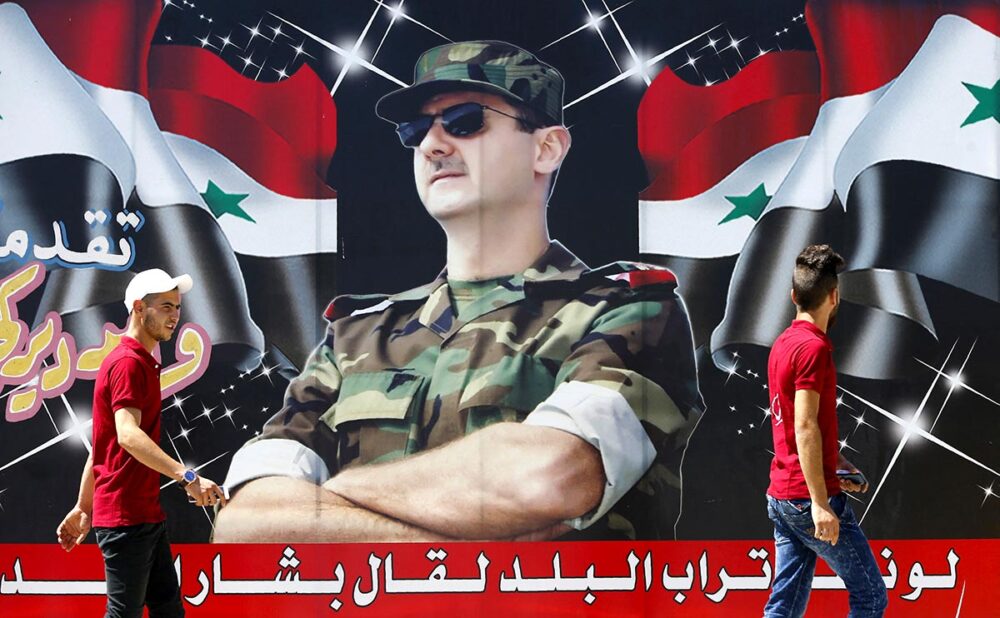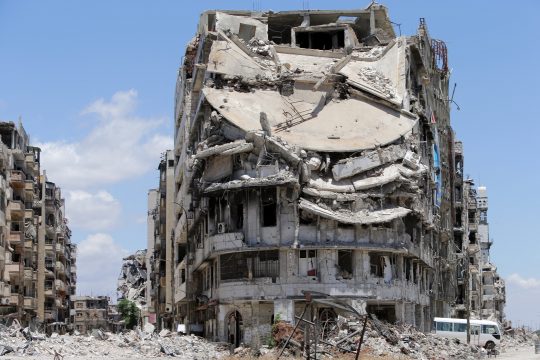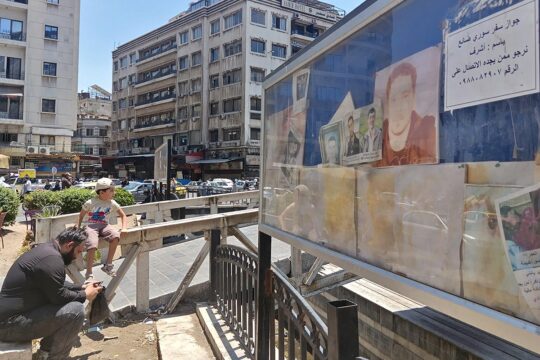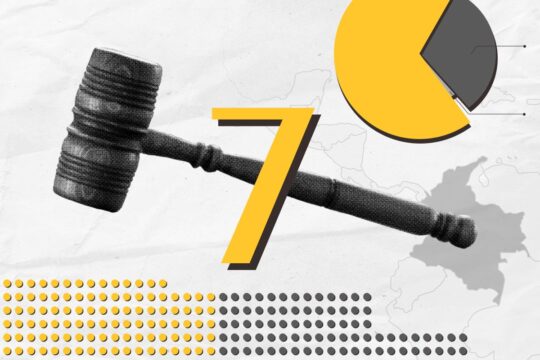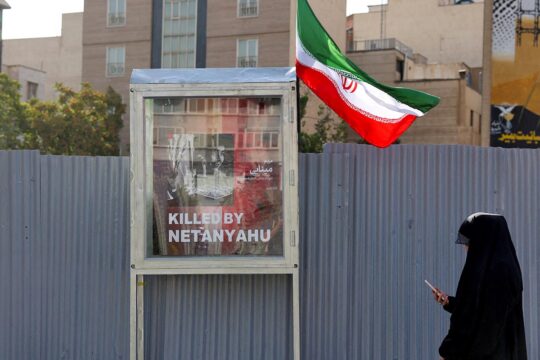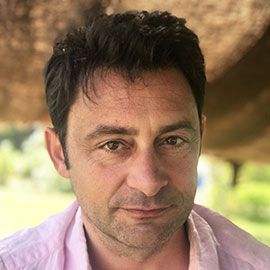The trial “by default” of three high-ranking Syrian officials, which opened on Tuesday 21 May, shows "France's strong desire to respond to the situation in Syria", emphasised General Jean-Philippe Reiland, head of the Office central de lutte contre les crimes contre l'humanité (Central Office for the fight against crimes against humanity, OCLCH), who attended the hearings before the Paris Assize Court. "It's an achievement", he said. Around thirty investigations have been opened by the OCLCH into Syrians reported on French territory. But trials are slow in coming. In this case, "there were two French-Syrian victims, so it was possible to bring them to trial more quickly," he explained.
The case heard this week, after the Court of Cassation threatened to annul some of the Syrian proceedings in 2021, is a kind of trial run for France, almost nine years after the promises made by its Foreign Minister at the United Nations in 2015. It is not being organised under universal jurisdiction, which presupposes the presence in France of an alleged perpetrator, but under a procedure known as "by default", which enables people living abroad to be tried. This is only possible because the victims are French (in this case Franco-Syrian). This trial lasts only four days, whereas universal jurisdiction trials last more than a month. There is no defence, and if the accused are ever arrested, they will be retried.
"This session marks the start of the fight against impunity that Syrians have been waiting for so long", stressed Ziad Majed, a political scientist and co-author of a book on the Syrian dictator entitled "Inside the head of Bashar al-Assad", as he opened the list of witnesses - five called by the prosecution and five by the civil parties. A few dozen Syrians from France attended the hearing, most of them members of associations defending the victims of the el-Assad regime. Their presence is encouraged by the provision of Arabic interpreters - a model recently used in the Netherlands in another Syrian trial. Around forty headsets were requested on the first day, we are told, and more like fifteen on the other days. With the dock empty, the defence bench is occupied by the interpreters.
"It is not the role of the Assize Court to appoint lawyers to represent defendants who have failed to appear for trial. It's not possible," says its president, Laurent Raviot, after explaining this unusual procedure - of which there is only one known precedent in France, concerning the Pinochet regime.
"Caesar" or the hell of repression
On the second day, the hearing of context witnesses called by the prosecution concluded with that of the OCLCH Middle East team leader, who was given the painful task of showing the photographs taken in Syria by a former Syrian forensic doctor known by the pseudonym "Caesar". The selection of raw images of the repressive hell into which hundreds of thousands of Syrians were plunged after the Damascus Spring of 2011 reveals around 150 brutalised, often emaciated bodies. These photographs were chosen because they were taken in Mezzeh prison, on the outskirts of Damascus, where Mazen and Patrick Abdelkader Dabbagh entered at the beginning of November 2013, never to leave it.
One by one, the petrified, numbered and labelled faces and bodies on the screen tell the story of the "administrative obsession" and the "desire to paralyse an entire society" described the day before by Ziad Majed. Hundreds of thousands of people arrested", he explained, means millions of people stuck with their families, put out of action by waiting, death or fear.
On the civil parties' bench, Obeida Dabbagh, Mazen's older brother, is the one who was not afraid, "except at the beginning", he admitted in his testimony to the court on 23 May. It was he who triggered the case on 3 October 2015, when he showed up at the OCLCH two years after the arrest of his brother and nephew. Spontaneously. He had just read in the press that French Foreign Minister Laurent Fabius had forwarded the Caesar report to the OCLCH and requested the opening of an investigation into crimes against humanity. Obeida made an initial statement to the investigators, as did his wife Hanane. The following year, this led to a first complaint against X for "torture and enforced disappearance", filed with the support of the International Federation for Human Rights (FIDH).
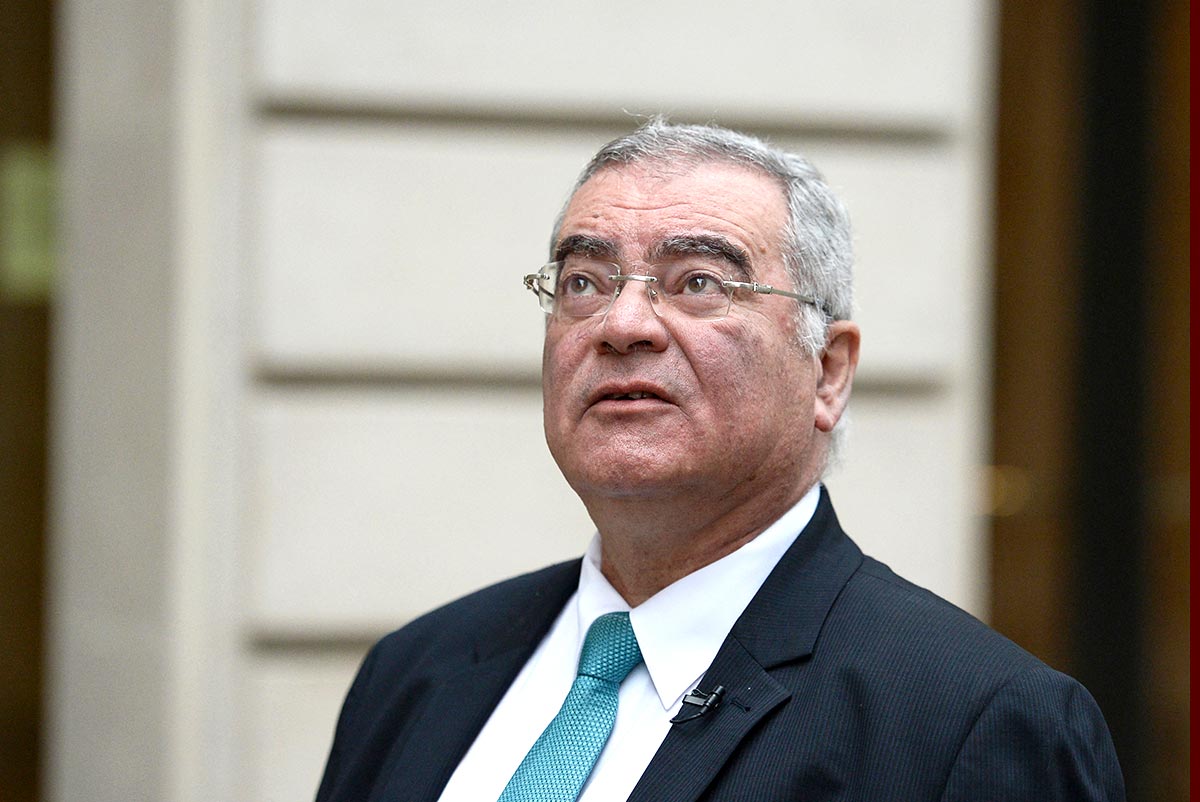
"A generous and cultured man"
Wearing a green polo shirt and metal-rimmed glasses, the 70-year-old holds the witness stand with both hands. He tells the court how he never gave up. An atomic engineer, he worked for the French company Thalès for forty years. Their father, he says, was not in agreement with the government but not openly in opposition either. A diplomat, "he preferred to stand aside" and obtain a post with the Secretary General of the Arab League. "Mazen, the youngest of the siblings, loved to laugh, he was always cheerful, and as the youngest he was pampered by my mother." The father was in Tunis, the brothers were scattered across Europe, but Mazen was the one who wanted to stay in Syria. Their mother, who is French, also stayed. She worked in Damascus for the cultural attaché at the French embassy. Mazen studied French literature and got married. His outspokenness was "not always appreciated by his colleagues" at the French lycée, where he was a teaching adviser. But Obeida described him as "a generous and very cultured man". Mazen's son Patrick, born in 1993, was rather "shy".
Patrick was 20 years old when, on 3 November 2013, officers from an air force unit came to arrest him at 11pm at the family home. They took his phone and computer equipment and reassured his parents that it was a simple interrogation: "Don't worry, it's just a matter of a few days." But at the same hour the next day, they came back for the father. "Sir, you've brought up your son badly, we need you to question him." Mazen was in his pyjamas and slippers. "You can get dressed," the officers told him. "There's no point, where you're taking me, you're going to take all that off," retorted Mazen with his usual sense of repartee. The soldiers took off in his car, which was brand new, beat up the driver of the Cyprus embassy, whose vehicle had to be moved, and also arrested Wissam Nasser, Mazen's brother-in-law, who was working for a powerful businessman. Released shortly afterwards, it was Nasser who told the family where Mazen and Patrick had been taken.
The prison at Mezzeh military airport, in the centre-west of Damascus, has a sinister reputation. On their arrival, Mazen and Wissam were violently tackled against the wall. The next day, at around 2pm, Patrick, who showed signs of having been beaten, was brought into their cell but reassured them. "It's not serious, I'm fine." They were then separated. Mazen was thrown into an overcrowded cell, similar to those described by the four Mezzeh survivors who testified at the trial. The best known of them, Mazen Darwish, a lawyer and founder of the Syrian Centre for Media and Freedom of Expression, was himself thrown with more than a hundred other people into a 40 sqm room "with no ventilation and no daylight". Mazen Dabbagh's brother-in-law reported the last words heard from him: "I'm suffocating, I'm suffocating, get me out of here."
Obeida learned of their arrests on 9 November 2013. He described to the court the ensuing battle to try and get news. Calls to well-placed acquaintances, who first reassured him, then told him that the case was getting tougher, and finally asked him to stop calling. Contacts with the French embassy, which had moved to Beirut, with the headmaster of the French lycée, with the crisis unit at the Ministry of Foreign Affairs, a letter to French President François Hollande… "We're going to do everything we can," he was told several times.
"An organized mafia economy"
Obeida paused for a moment and blot himself with a handkerchief. In Syria, he said, $15,000 was paid against his advice via an intermediary to Abdel Salam Mahmoud, the director of the investigations department of the air force intelligence service - of which Mezzeh prison depends. The money was supposed to be used to move Mazen to a civilian prison. Two weeks later, the intermediary apologised: they hadn't checked, but Mazen had been dead since March 2015, he said, offering to provide a death certificate for an extra $15,000. A "ransom system organised to obtain information and [an] organised mafia economy under the control of the regime to produce rumours, monetise death certificates or the return of bodies," explained political scientist Majed. The following year, the family home was requisitioned. Mazen's wife and daughter were evicted and the premises were occupied by members of the air force intelligence service, including Salam Mahmoud, according to information obtained by Obeida.
In the case of the Dabbaghs, the bodies were not returned. However, death certificates were eventually issued in August 2018, without specifying the cause of death or proving that Mazen died on 25 November 2017 and Patrick on 21 January 2014.
In France that summer, Obeida and Hanane organised a ceremony "to start mourning". On 12 October 2018, these documents also enabled French investigating judges to issue three arrest warrants for "complicity in crimes against humanity" - against Abdel Salam Mahmoud, his superior Jamil Hassan, and Ali Mamlouk, head of the national security office at the time of the events.
The three men are respectively considered to be the Syrian regime's No. 132, No. 10 and No. 3 on the Council of the European Union's list of officials targeted by sanctions - a list drawn up in May 2013, just over six months before the arrest of the Dabbagh father and son. They are also the big absentees from this trial, and will not be able to help Obeida understand what he will be looking for all his life: why his brother and nephew were killed. Theories swirl around in the engineer's head, but he can't come to any firm conclusions. "I hope that Patrick and Mazen, wherever they are, can see that I never gave up and that I was always there for them. They are the torchbearers, the spokespeople for the hundreds of thousands of Syrians who have disappeared like them."


